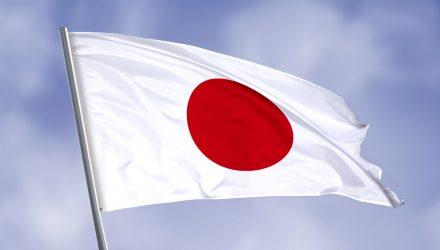The MSCI Japan Index is higher by 8.34% year-to-date in what could be a sign that global investors are finally nibbling at Japanese equities.
They have good reason to do just that. Broadly speaking, stocks in the world’s third-largest economy are attractively valued, sport compelling volatility traits and central bank goings-on aren’t yet material in the country. That is to say, the Bank of Japan isn’t likely to hike interest rates anytime soon.
With that in mind, although the dollar is poised to weaken, currency hedging remains an attractive way for investors to approach Japanese stocks. That thesis is playing out in real-time in 2023 as the WisdomTree Japan Hedged Equity Fund (DXJ) is beating the unhedged MSCI Japan Index by about 430 basis points since the start of the year. Some market observers believe more upside is on the way for Japanese stocks.
“Low valuations and a tailwind of rising buybacks and dividends driven by the government and activists pushing to improve profitability,” wrote Rareview Macro founder Neil Azous in a recent report. “The economy is seeing an independent boost from corporate investment in reshoring production and wages that have begun to grow. This makes Japan more immune to a U.S. recession. Interest rates remain low on an absolute basis. The currency has stabilized or will strengthen if Yield Curve Control (YCC) is /adjusted removed, which reduces imported inflation.”
What could act as fuel for DXJ’s fire is an interesting scenario: More local investors entering Japanese stocks. While the asset class has long been embraced by institutional investors there, Japanese retail investors have long favored heavier allocations to other asset classes. That’s starting to change.
“Now, Japan wants more people to invest in the stock market and fund their retirement, but a change in mentality among everyday people still needs to happen. To date, Governance changes are encouraging, but most measures are suggestions for now. That appears to be changing. A big story in Japanese markets this year is the Tokyo Stock Exchange (TSE) move to push companies to focus more on their cost of capital and stock prices,” added Azous.
Still, institutional investors are of course relevant in charting outcomes for DXJ member firms. Fortunately, there’s evidence that those market participants are embracing some of the ETF’s holdings, particularly from the financial services sector. That group accounts for 14.71% of the ETF’s portfolio.
“Large investors are reducing exposure to U.S. banks and increasing exposure to Japanese banks. On April 5th, Nikkei reported that Berkshire Hathaway was preparing to issue yen-denominated bonds, which was viewed as a signal that the conglomerate would increase its investments in Japan. On April 11th, Warrant Buffet said he raised his stakes in Japan’s five largest trading houses – known as sogo shosha – and said he might increase his holdings even further,” concluded Azous.
For more news, information, and analysis, visit the Modern Alpha Channel.
The opinions and forecasts expressed herein are solely those of Tom Lydon, and may not actually come to pass. Information on this site should not be used or construed as an offer to sell, a solicitation of an offer to buy, or a recommendation for any product.








